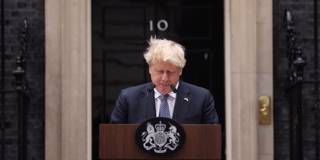OnPoint Subscriber Exclusive
The Big Picture brings together a range of PS commentaries to give readers a comprehensive understanding of topics in the news – and the deeper issues driving the news. The Big Question features concise contributor analysis and predictions on timely topics.

Rudderless Britain
Boris Johnson’s departure from 10 Downing Street comes at a time when the predictable economic consequences of his signature project – ending Britain’s membership of the European Union – are starting to bite. Worse, the damage Johnson’s populist, dishonest leadership inflicted on British political life will not be easily repaired.
In this Big Picture, psychiatrist Raj Persaud frames Johnson’s premiership as a clear case of “Prozac leadership.” The politician’s job is to “cheer people up without actually fixing what is wrong in their lives.”
Chris Patten, the last British governor of Hong Kong and chancellor of the University of Oxford, also turns to a clinical metaphor. The United Kingdom, he laments, is suffering from “Long Boris” – a malady that persists after the infection has passed. “The corrosive long-term effects of Britain’s departure from the European Union on both the economy and the language and conduct of our politics,” Patten writes, “is being compounded by the corrupting and debilitating impact of Johnson’s premiership on British politics and government.”
Robert Skidelsky, Professor Emeritus at Warwick University, agrees, though, like Persaud, he argues that Johnson is more a symptom than a cause of the UK’s political dysfunction. “Johnson is both a creature and a victim of identity politics,” Skidelsky observes. Because political leadership is “now about oneself,” personality flaws become the only story to tell about politicians.
Likewise, Antara Haldar, a professor of empirical legal studies at the University of Cambridge, thinks what ails Britain is bigger than Johnson, but she homes in on flawed political institutions. “Johnson is a problem in his own right,” she says, “but his behavior – and the backlash against it – is symptomatic of a deeper issue: the system no longer serves the people.”
Johnson thus leaves behind a Britain that seems singularly ill-prepared to confront its post-Brexit challenges head-on, a perception reflected in currency markets. “Traders appear to view sterling more like the currency of a troubled emerging market than of a stable advanced economy,” notes Barry Eichengreen of the University of California, Berkeley. That, too, is a symptom of a deeper problem: slow productivity growth – a long-term economic obstacle that “is now compounded by the frictions and inefficiencies brought about by Brexit.”